外研版(2019)选择性必修第四册课件Unit 1 Looking forwards Using language课件(共30张PPT)
文档属性
| 名称 | 外研版(2019)选择性必修第四册课件Unit 1 Looking forwards Using language课件(共30张PPT) |
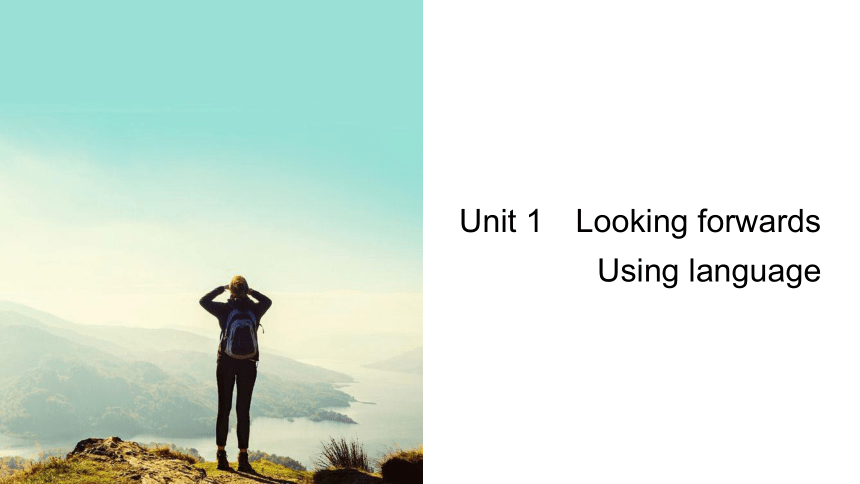
|
|
| 格式 | pptx | ||
| 文件大小 | 366.2KB | ||
| 资源类型 | 教案 | ||
| 版本资源 | 外研版(2019) | ||
| 科目 | 英语 | ||
| 更新时间 | 2023-05-09 00:00:00 | ||
图片预览

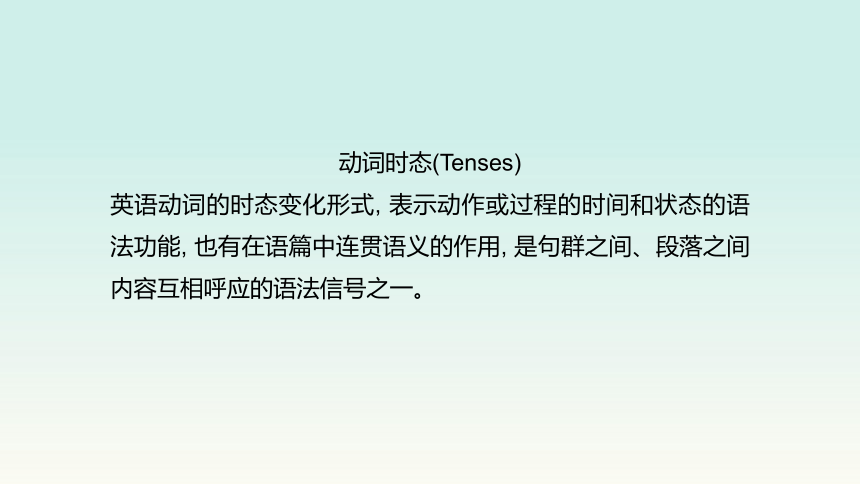
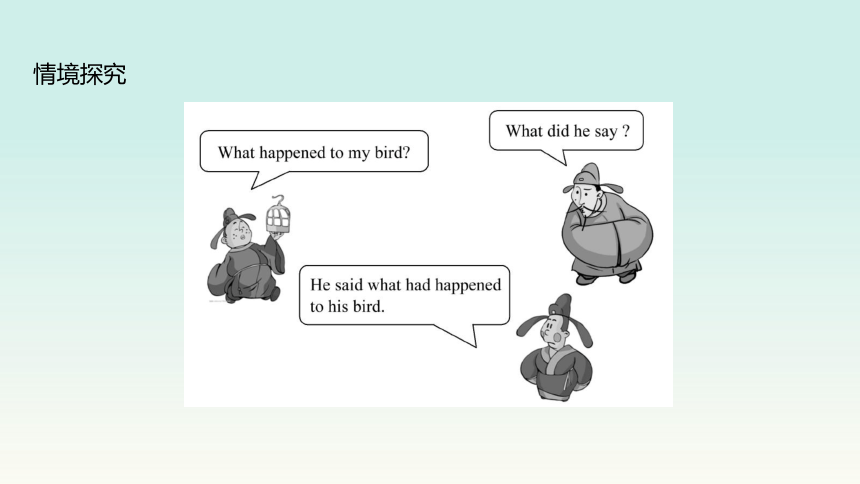

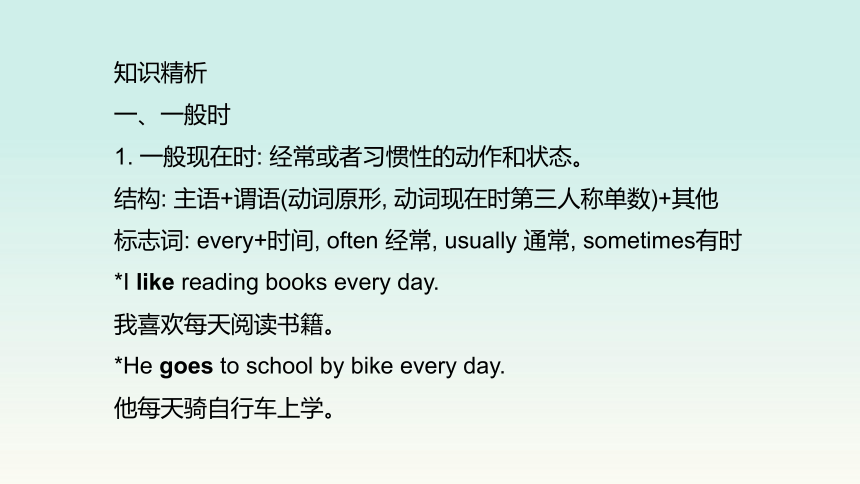
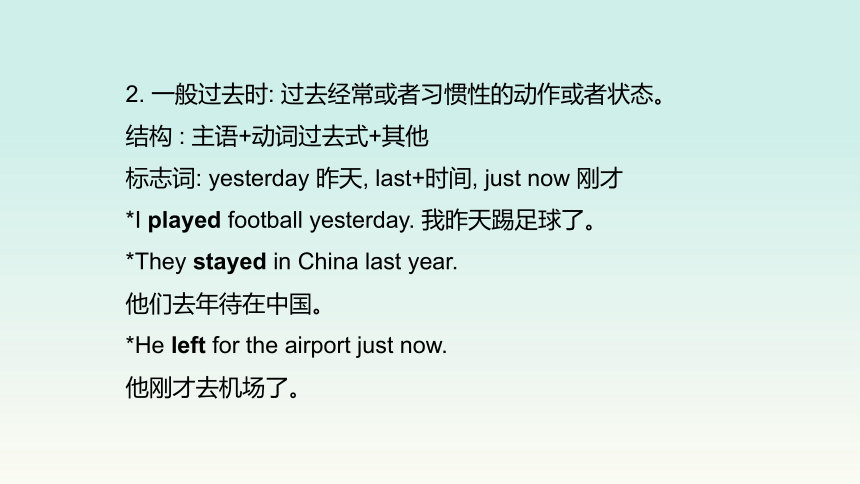

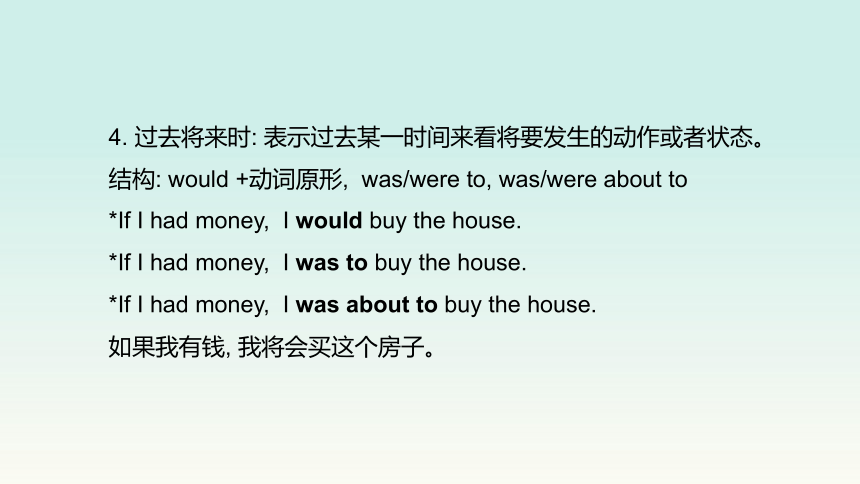
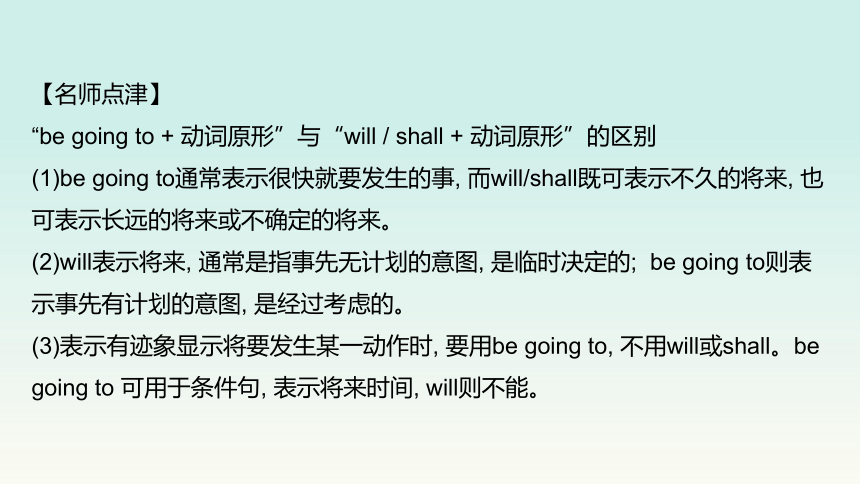
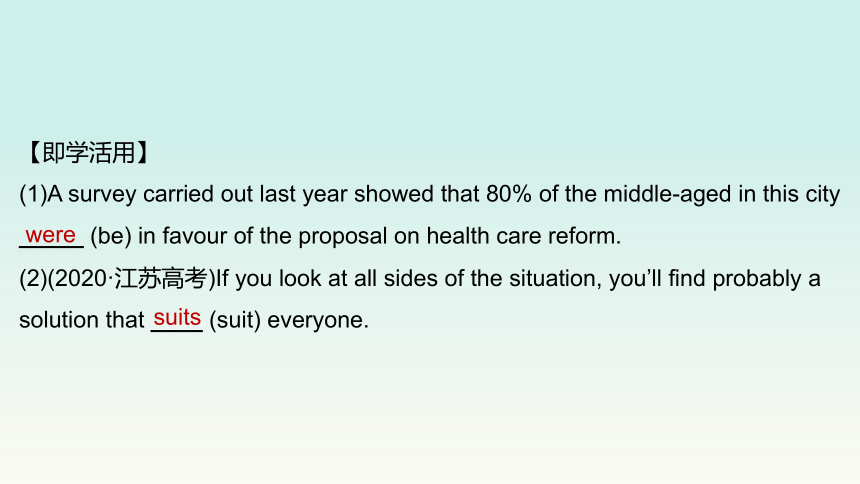
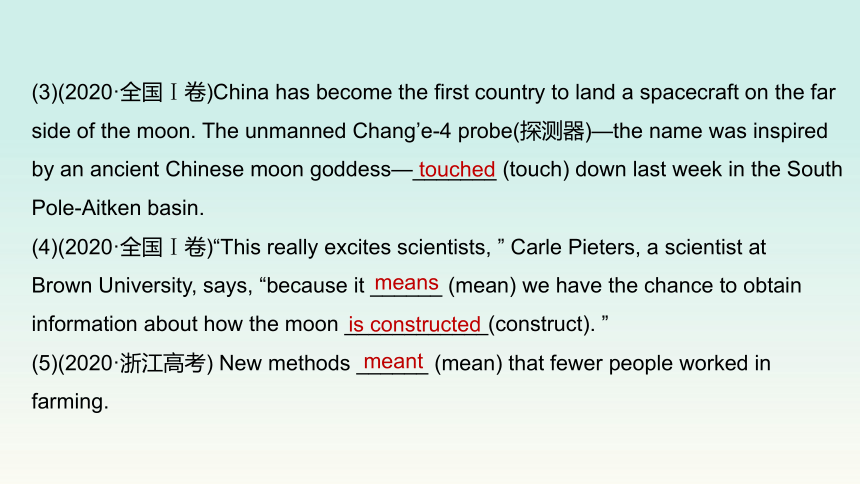
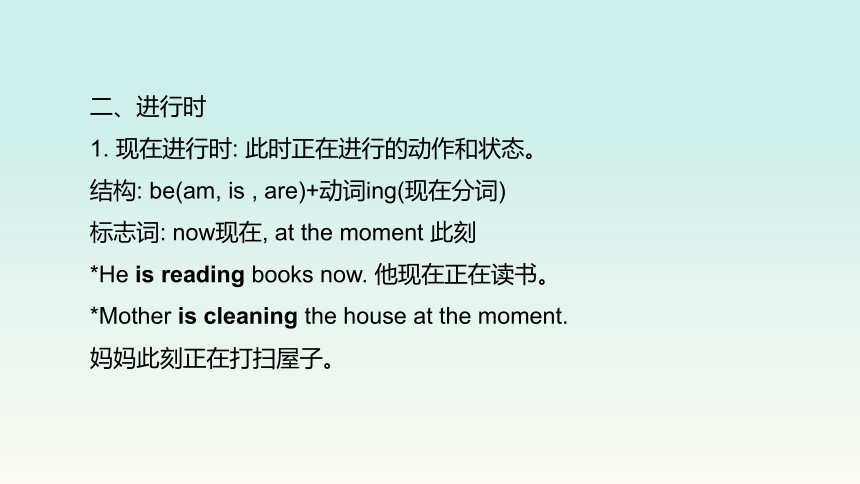
文档简介
(共30张PPT)
Unit 1 Looking forwards
Using language
动词时态(Tenses)
英语动词的时态变化形式, 表示动作或过程的时间和状态的语法功能, 也有在语篇中连贯语义的作用, 是句群之间、段落之间内容互相呼应的语法信号之一。
情境探究
观察上面对话, 并完成句子。
1. I ____ a word with Julia this morning.
这天早晨, 我跟朱丽亚说了几句话。
2. We ___________a good time yesterday.
我们昨天没有玩好。
3. Lucy _________ English at the moment.
露西此刻正在学英语。
had
did not have
is learning
知识精析
一、一般时
1. 一般现在时: 经常或者习惯性的动作和状态。
结构: 主语+谓语(动词原形, 动词现在时第三人称单数)+其他
标志词: every+时间, often 经常, usually 通常, sometimes有时
*I like reading books every day.
我喜欢每天阅读书籍。
*He goes to school by bike every day.
他每天骑自行车上学。
2. 一般过去时: 过去经常或者习惯性的动作或者状态。
结构 : 主语+动词过去式+其他
标志词: yesterday 昨天, last+时间, just now 刚才
*I played football yesterday. 我昨天踢足球了。
*They stayed in China last year.
他们去年待在中国。
*He left for the airport just now.
他刚才去机场了。
3. 一般将来时: 将来将要发生的动作和状态。
结构: 主语+shall(第一人称疑问句)/will/be going to +动词原形
标志词: tomorrow, next+时间, in+时间段, soon, the following +时间
*I will come to visit you soon. 我很快就会来看你的。
*I am going to go abroad next month.
我下个月将要出国。
*Shall I go to school tomorrow 我明天将要去上学吗
4. 过去将来时: 表示过去某一时间来看将要发生的动作或者状态。
结构: would +动词原形, was/were to, was/were about to
*If I had money, I would buy the house.
*If I had money, I was to buy the house.
*If I had money, I was about to buy the house.
如果我有钱, 我将会买这个房子。
【名师点津】
“be going to + 动词原形”与“will / shall + 动词原形”的区别
(1)be going to通常表示很快就要发生的事, 而will/shall既可表示不久的将来, 也可表示长远的将来或不确定的将来。
(2)will表示将来, 通常是指事先无计划的意图, 是临时决定的; be going to则表示事先有计划的意图, 是经过考虑的。
(3)表示有迹象显示将要发生某一动作时, 要用be going to, 不用will或shall。be going to 可用于条件句, 表示将来时间, will则不能。
【即学活用】
(1)A survey carried out last year showed that 80% of the middle-aged in this city
_____ (be) in favour of the proposal on health care reform.
(2)(2020·江苏高考)If you look at all sides of the situation, you’ll find probably a
solution that ____ (suit) everyone.
were
suits
(3)(2020·全国Ⅰ卷)China has become the first country to land a spacecraft on the far
side of the moon. The unmanned Chang’e-4 probe(探测器)—the name was inspired
by an ancient Chinese moon goddess—_______ (touch) down last week in the South
Pole-Aitken basin.
(4)(2020·全国Ⅰ卷)“This really excites scientists, ” Carle Pieters, a scientist at
Brown University, says, “because it ______ (mean) we have the chance to obtain
information about how the moon ____________(construct). ”
(5)(2020·浙江高考) New methods ______ (mean) that fewer people worked in
farming.
touched
means
is constructed
meant
二、进行时
1. 现在进行时: 此时正在进行的动作和状态。
结构: be(am, is , are)+动词ing(现在分词)
标志词: now现在, at the moment 此刻
*He is reading books now. 他现在正在读书。
*Mother is cleaning the house at the moment.
妈妈此刻正在打扫屋子。
2. 过去进行时: 过去某时刻正在进行的动作和状态。
结构: was, were +动词ing(现在分词)
标志词: at that moment 那时, 过去某个时刻
*He was reading a book at that moment.
他在那个时刻正在读书。
*It was raining when they left the station.
他们离开车站的时候天正在下雨。
*We were watching TV from seven to nine last night.
昨天晚上七点到九点的时候我们在看电视。
3. 将来进行时: 将来某个时刻正在进行的动作和状态。
结构: will/shall(第一人称疑问句)+be+动词ing(现在分词)+其他
标志词: 将来某个时刻
*He will be singing at eight tomorrow morning.
他将在明天上午八点唱歌。
*This time tomorrow they will be playing bowling or softball.
明天这个时候他们将打保龄球或垒球。
*She will be taking care of the outpatient while you are away.
你不在的时候她会照顾门诊病人。
4. 现在完成进行时: 过去发生的动作对现在造成的影响, 并且这个动作正在持续。
结构: have/has+been +动词ing(现在分词)
*He has been doing this work for three years.
这工作他已干了三年了。
*It has been raining since last Sunday.
自上周星期日以来就一直在下雨。
*The reform has been going on for nearly a decade.
改革已进行近十年了。
【即学活用】
(1)Susan had quit her well-paid job and ___________(work) as a volunteer in the
neighbourhood when I visited her last year.
(2)—Could I use your car tomorrow morning
—Sure. I _____________(write) a report at home.
(3)He hurried home, never once looking back to see if he _________________
(follow).
was working
will be writing
was being followed
三、完成时
1. 现在完成时: 过去发生的动作对现在造成的影响。
结构: have/has+动词ed(动词过去分词)
标志词: since, before, for+一段时间, already, in the past/last+时间段, yet, up to now等。
*He has lived here since 1978.
自从1978年以来, 他一直住在这儿。
*I have been in the army for more than 5 years.
我在部队已经待了五年多了。
*I have heard nothing from him up to now.
到目前为止我没有他的任何消息。
*Great changes have taken place in our country in the past few years.
我们的国家在过去的几年中发生了巨大的变化。
2. 过去完成时: 过去的过去发生的动作对过去的影响。
结构: had+done(动词过去分词)
*He had washed his clothes for two hours by the time I got here yesterday.
昨天我到这里的时候, 他已经洗了两个小时衣服了。
*By nine o’clock last night, we had got 200 pictures from the spaceship.
到昨晚九点, 我们收到了200张来自宇宙飞船的照片。
*I had been at the bus stop for 20 minutes when a bus finally came.
我在公共汽车站等了20分钟, 终于有一辆公共汽车来了。
*He said he had worked in that factory since 1949。
他说他从1949年起就在那家工厂工作。
【名师点津】现在完成时和一般过去时的区别
(1)两者都可表示过去发生过的动作, 但前者表示的是过去的动作对现在的影响, 而后者则只是表示过去有这一动作的事实。
(2)两者都可表示过去开始并延续了一段时间的动作, 现在完成时表示该动作仍在继续, 而一般过去时则说明该动作现已终止。
【即学活用】 用所给动词的正确形式填空。
(1)(2020·江苏高考)Instead of getting down to a new task as I ____________
(expect), he examined the previous work again.
(2)—The machine is working again!
—Yes, it broke down yesterday, but it _____________(fix).
(3)(2019·全国卷Ⅱ)I love coming here and seeing my family and all the friends I
__________(make) over the years.
had expected
has been fixed
have made
(4)(2019·天津高考)I _________(hope) to send Peter a gift to congratulate him on
his marriage, but I couldn’t manage it.
(5)He _______ (work)in a factory in 1986.
(6)He ___________(read)a novel when I came in.
(7)He __________(study)English since 1985.
(8)By the end of last year we ________(build)five new houses.
(9)I ______________(live) here for three years.
(10)Before he slept, he ___________(work)for 12 hours.
had hoped
worked
was reading
has studied
had built
have been living
had worked
课后训练
Ⅰ. 用动词的正确时态填空
1. —I dropped in at your house at about ten last night, but you weren’t in.
—I _________(do)regular exercises at the club.
2. My dictionary is missing. I have looked for it everywhere but still ____________
(find)it.
3. The vegetables didn’t taste very good. They _______________(cook)too long.
4. The train ___________(go)at the present speed until it reaches the foot of the
mountain at about nine o’clock tonight.
was doing
haven’t found
had been cooked
will be going
5. I first met Tom 10 years ago. He ___________(work)in a radio factory at that
time.
6. I ________________(wait)for you for almost 2 hours.
7. He just told me that he __________(help) me when I was in trouble.
8. When they reached there, the ship _______(set)off.
9. In the past two years, I __________(make)many friends in the school.
10. I ________________(stay)in China since I was ten.
was working
have been waiting
would help
had set
have made
have been staying
Ⅱ. 根据汉语提示翻译句子
1. 昨天我们去了公园。
___________________________
2. 狗在吃骨头。
______________________
3. 汤姆每天早上起得很早。
_____________________________
Yesterday we went to the park.
The dog is eating a bone.
Tom gets up early every morning.
4. 他教英语已经8年了。
_____________________________
5. 雨已经连续下了一整天了。
_______________________
6. 雨很快就要停了。
____________________
He has taught English for 8 years.
It has been raining all day.
The rain will stop soon.
语法应用——综合运用所学时态翻译下列语段。
长城, 可以追溯到2000年前, 是中华文明的象征。全长8851. 8千米。历史上, 长城在经济发展和国家防御方面起到了重要的作用。张鹤珊保护长城已经40多年了。他1978年开始在城墙上巡逻(patrol)。他说他每天要花四个小时检查是否有新的损坏。 他的努力逐渐有了回报。
The Great Wall, dating back to 2, 000 years ago, is the symbol of Chinese civilization. Its total length is 8851. 8 kilometers. In the history, the Great Wall played an important role in the economic development and protection of the country. Zhang Heshan has been protecting the Great Wall for more than 40 years. He started to patrol the wall in 1978. He said he would spend about four hours daily checking if there was any fresh damage. His effort has gradually paid off.
Thanks
Unit 1 Looking forwards
Using language
动词时态(Tenses)
英语动词的时态变化形式, 表示动作或过程的时间和状态的语法功能, 也有在语篇中连贯语义的作用, 是句群之间、段落之间内容互相呼应的语法信号之一。
情境探究
观察上面对话, 并完成句子。
1. I ____ a word with Julia this morning.
这天早晨, 我跟朱丽亚说了几句话。
2. We ___________a good time yesterday.
我们昨天没有玩好。
3. Lucy _________ English at the moment.
露西此刻正在学英语。
had
did not have
is learning
知识精析
一、一般时
1. 一般现在时: 经常或者习惯性的动作和状态。
结构: 主语+谓语(动词原形, 动词现在时第三人称单数)+其他
标志词: every+时间, often 经常, usually 通常, sometimes有时
*I like reading books every day.
我喜欢每天阅读书籍。
*He goes to school by bike every day.
他每天骑自行车上学。
2. 一般过去时: 过去经常或者习惯性的动作或者状态。
结构 : 主语+动词过去式+其他
标志词: yesterday 昨天, last+时间, just now 刚才
*I played football yesterday. 我昨天踢足球了。
*They stayed in China last year.
他们去年待在中国。
*He left for the airport just now.
他刚才去机场了。
3. 一般将来时: 将来将要发生的动作和状态。
结构: 主语+shall(第一人称疑问句)/will/be going to +动词原形
标志词: tomorrow, next+时间, in+时间段, soon, the following +时间
*I will come to visit you soon. 我很快就会来看你的。
*I am going to go abroad next month.
我下个月将要出国。
*Shall I go to school tomorrow 我明天将要去上学吗
4. 过去将来时: 表示过去某一时间来看将要发生的动作或者状态。
结构: would +动词原形, was/were to, was/were about to
*If I had money, I would buy the house.
*If I had money, I was to buy the house.
*If I had money, I was about to buy the house.
如果我有钱, 我将会买这个房子。
【名师点津】
“be going to + 动词原形”与“will / shall + 动词原形”的区别
(1)be going to通常表示很快就要发生的事, 而will/shall既可表示不久的将来, 也可表示长远的将来或不确定的将来。
(2)will表示将来, 通常是指事先无计划的意图, 是临时决定的; be going to则表示事先有计划的意图, 是经过考虑的。
(3)表示有迹象显示将要发生某一动作时, 要用be going to, 不用will或shall。be going to 可用于条件句, 表示将来时间, will则不能。
【即学活用】
(1)A survey carried out last year showed that 80% of the middle-aged in this city
_____ (be) in favour of the proposal on health care reform.
(2)(2020·江苏高考)If you look at all sides of the situation, you’ll find probably a
solution that ____ (suit) everyone.
were
suits
(3)(2020·全国Ⅰ卷)China has become the first country to land a spacecraft on the far
side of the moon. The unmanned Chang’e-4 probe(探测器)—the name was inspired
by an ancient Chinese moon goddess—_______ (touch) down last week in the South
Pole-Aitken basin.
(4)(2020·全国Ⅰ卷)“This really excites scientists, ” Carle Pieters, a scientist at
Brown University, says, “because it ______ (mean) we have the chance to obtain
information about how the moon ____________(construct). ”
(5)(2020·浙江高考) New methods ______ (mean) that fewer people worked in
farming.
touched
means
is constructed
meant
二、进行时
1. 现在进行时: 此时正在进行的动作和状态。
结构: be(am, is , are)+动词ing(现在分词)
标志词: now现在, at the moment 此刻
*He is reading books now. 他现在正在读书。
*Mother is cleaning the house at the moment.
妈妈此刻正在打扫屋子。
2. 过去进行时: 过去某时刻正在进行的动作和状态。
结构: was, were +动词ing(现在分词)
标志词: at that moment 那时, 过去某个时刻
*He was reading a book at that moment.
他在那个时刻正在读书。
*It was raining when they left the station.
他们离开车站的时候天正在下雨。
*We were watching TV from seven to nine last night.
昨天晚上七点到九点的时候我们在看电视。
3. 将来进行时: 将来某个时刻正在进行的动作和状态。
结构: will/shall(第一人称疑问句)+be+动词ing(现在分词)+其他
标志词: 将来某个时刻
*He will be singing at eight tomorrow morning.
他将在明天上午八点唱歌。
*This time tomorrow they will be playing bowling or softball.
明天这个时候他们将打保龄球或垒球。
*She will be taking care of the outpatient while you are away.
你不在的时候她会照顾门诊病人。
4. 现在完成进行时: 过去发生的动作对现在造成的影响, 并且这个动作正在持续。
结构: have/has+been +动词ing(现在分词)
*He has been doing this work for three years.
这工作他已干了三年了。
*It has been raining since last Sunday.
自上周星期日以来就一直在下雨。
*The reform has been going on for nearly a decade.
改革已进行近十年了。
【即学活用】
(1)Susan had quit her well-paid job and ___________(work) as a volunteer in the
neighbourhood when I visited her last year.
(2)—Could I use your car tomorrow morning
—Sure. I _____________(write) a report at home.
(3)He hurried home, never once looking back to see if he _________________
(follow).
was working
will be writing
was being followed
三、完成时
1. 现在完成时: 过去发生的动作对现在造成的影响。
结构: have/has+动词ed(动词过去分词)
标志词: since, before, for+一段时间, already, in the past/last+时间段, yet, up to now等。
*He has lived here since 1978.
自从1978年以来, 他一直住在这儿。
*I have been in the army for more than 5 years.
我在部队已经待了五年多了。
*I have heard nothing from him up to now.
到目前为止我没有他的任何消息。
*Great changes have taken place in our country in the past few years.
我们的国家在过去的几年中发生了巨大的变化。
2. 过去完成时: 过去的过去发生的动作对过去的影响。
结构: had+done(动词过去分词)
*He had washed his clothes for two hours by the time I got here yesterday.
昨天我到这里的时候, 他已经洗了两个小时衣服了。
*By nine o’clock last night, we had got 200 pictures from the spaceship.
到昨晚九点, 我们收到了200张来自宇宙飞船的照片。
*I had been at the bus stop for 20 minutes when a bus finally came.
我在公共汽车站等了20分钟, 终于有一辆公共汽车来了。
*He said he had worked in that factory since 1949。
他说他从1949年起就在那家工厂工作。
【名师点津】现在完成时和一般过去时的区别
(1)两者都可表示过去发生过的动作, 但前者表示的是过去的动作对现在的影响, 而后者则只是表示过去有这一动作的事实。
(2)两者都可表示过去开始并延续了一段时间的动作, 现在完成时表示该动作仍在继续, 而一般过去时则说明该动作现已终止。
【即学活用】 用所给动词的正确形式填空。
(1)(2020·江苏高考)Instead of getting down to a new task as I ____________
(expect), he examined the previous work again.
(2)—The machine is working again!
—Yes, it broke down yesterday, but it _____________(fix).
(3)(2019·全国卷Ⅱ)I love coming here and seeing my family and all the friends I
__________(make) over the years.
had expected
has been fixed
have made
(4)(2019·天津高考)I _________(hope) to send Peter a gift to congratulate him on
his marriage, but I couldn’t manage it.
(5)He _______ (work)in a factory in 1986.
(6)He ___________(read)a novel when I came in.
(7)He __________(study)English since 1985.
(8)By the end of last year we ________(build)five new houses.
(9)I ______________(live) here for three years.
(10)Before he slept, he ___________(work)for 12 hours.
had hoped
worked
was reading
has studied
had built
have been living
had worked
课后训练
Ⅰ. 用动词的正确时态填空
1. —I dropped in at your house at about ten last night, but you weren’t in.
—I _________(do)regular exercises at the club.
2. My dictionary is missing. I have looked for it everywhere but still ____________
(find)it.
3. The vegetables didn’t taste very good. They _______________(cook)too long.
4. The train ___________(go)at the present speed until it reaches the foot of the
mountain at about nine o’clock tonight.
was doing
haven’t found
had been cooked
will be going
5. I first met Tom 10 years ago. He ___________(work)in a radio factory at that
time.
6. I ________________(wait)for you for almost 2 hours.
7. He just told me that he __________(help) me when I was in trouble.
8. When they reached there, the ship _______(set)off.
9. In the past two years, I __________(make)many friends in the school.
10. I ________________(stay)in China since I was ten.
was working
have been waiting
would help
had set
have made
have been staying
Ⅱ. 根据汉语提示翻译句子
1. 昨天我们去了公园。
___________________________
2. 狗在吃骨头。
______________________
3. 汤姆每天早上起得很早。
_____________________________
Yesterday we went to the park.
The dog is eating a bone.
Tom gets up early every morning.
4. 他教英语已经8年了。
_____________________________
5. 雨已经连续下了一整天了。
_______________________
6. 雨很快就要停了。
____________________
He has taught English for 8 years.
It has been raining all day.
The rain will stop soon.
语法应用——综合运用所学时态翻译下列语段。
长城, 可以追溯到2000年前, 是中华文明的象征。全长8851. 8千米。历史上, 长城在经济发展和国家防御方面起到了重要的作用。张鹤珊保护长城已经40多年了。他1978年开始在城墙上巡逻(patrol)。他说他每天要花四个小时检查是否有新的损坏。 他的努力逐渐有了回报。
The Great Wall, dating back to 2, 000 years ago, is the symbol of Chinese civilization. Its total length is 8851. 8 kilometers. In the history, the Great Wall played an important role in the economic development and protection of the country. Zhang Heshan has been protecting the Great Wall for more than 40 years. He started to patrol the wall in 1978. He said he would spend about four hours daily checking if there was any fresh damage. His effort has gradually paid off.
Thanks
